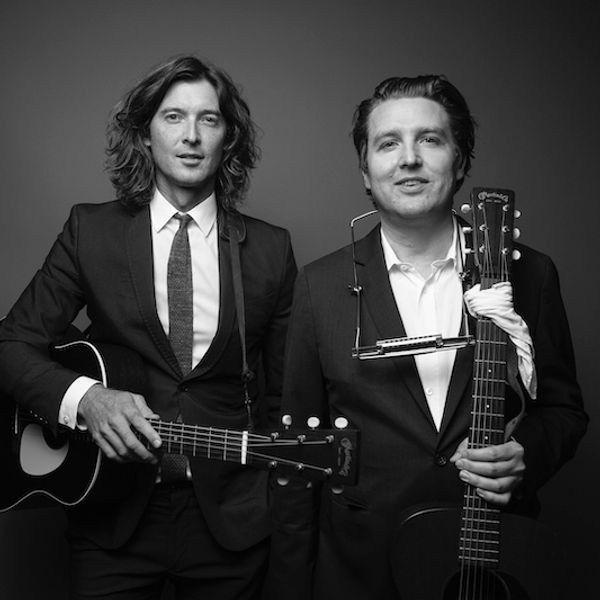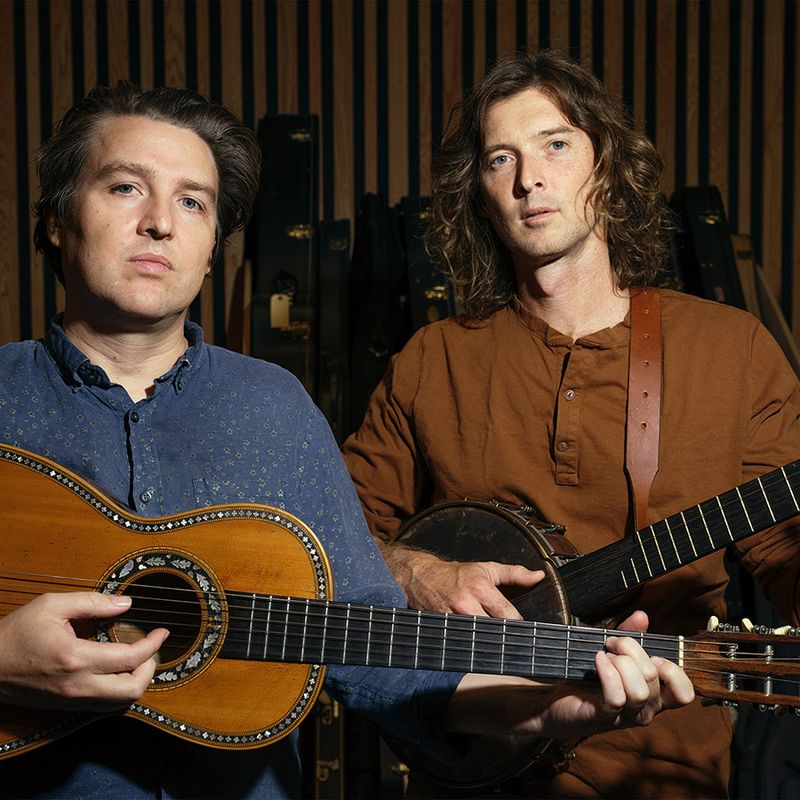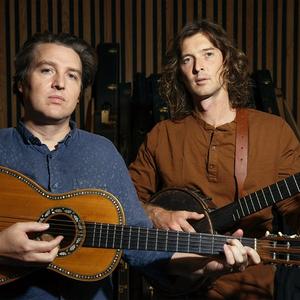




Link copied

In a green room backstage at the Germantown Performing Arts Center just outside Memphis, TN, Joey Ryan and Kenneth Pattengale of The Milk Carton Kids tuck into their pre-show meal of salmon, French fries and store-brand kombucha. Though the wild-eyed California showmen recently entered their 40s, they joke that they will never go by The Milk Carton Men, primarily because Joey still goes by Joey.
Fans of this often-sparring duo know when they speak, there is a 50/50 chance they are simply following a brainwave of improv rather than relaying concrete information. Still, amid their wiseacre chatter, genuine wisdom emanates. They possess superb self-awareness and an irresistible curiosity for the human condition – something which is expertly captured in their forthcoming album, I Only See the Moon.
Set to release on May 19, the new album marks the band’s first release since 2019’s critically-acclaimed The Only Ones.
With Pattengale producing out of their home studios in and around the San Fernando Valley, it turns out the extended process of crafting this new collection of songs was one where they scrapped nearly everything they had worked on to that point - over dozens of sessions - to start again, an act which they feel reflects the way that the world had changed around them in the COVID-19 era.
Bolstered by undreamed-of talent, The Milk Carton Kids feel this new record is their best and most personal work yet, an attempt to form a more stark and direct connection with their audience.
As we examined the inward-looking music, the duo touched on a range of influences and current ideals, including the importance of words in their songs, their general distaste for the music video medium at large and the evolution of their approach to writing and producing.
What can you tell us about the process of crafting your newly announced forthcoming album, I Only See the Moon? Did you work together with the two of you producing?
Joey: Kenneth is the producer.
Kenneth: Yeah, I produced it. We used to produce together, but then we let Joey go and I produced the whole thing. He still played and wrote his half, but I produced it. So it's a markedly different album because of that.
Probably the single biggest effect was that whatever the chaos of creating a musical identity through collaboration is, that’s not very intentional of a process by its nature.
With me producing, I think that it became a little bit more intentional; if there ever came time to make choices that would push it in one direction or the other, I was granted the authority to do it. I got to make some of the decisions that in the past we’d have made as part of the collaborative process. I think that ends up maybe making the identity a little bit sharper, just because it was filtered through one person.
I bet if Joey were doing it, it would have benefited from the same thing but would have sounded different per his taste and intention.
A big part of our early records, as far as the listener was concerned, was that they found a lot of intimacy to contend with and to soak up. That got a little lost over the years. One of the things we wanted to do was try to make as intimate an album as our first one, emotionally anyway, and I think that we did that.
What was going on in your lives at the time when you were producing the album and how did those experiences work their way into the music?
Joey: On the songwriting front, I feel we both were coming with songs that just felt very personal and inward-looking. There’s a big dichotomy to me in songwriting between inward-facing and outward-facing perspectives (in singer-songwriter music, anyway).
But logistically, I think that what was going in our lives, which is the dominant narrative, is what was going on in everybody’s lives: we lost our jobs, the world shut down and everybody’s priorities got thrown into relief in a way that hadn’t been before. We had to really slow down and examine what was important, what we were really in this for in the first place and what we liked about playing music together and traveling around.
For the first time, not being allowed to travel around and play music for people made us realize the things we loved about it - wanting to make an intimate feeling and sounding record was part of that. One of the things we learned about ourselves is that we enjoy that really stark connection with an audience, and we figured out that’s what they like about us.
Logistically, it took us over a year to make this album from the day we first went into the studio. And the number of days we spent in the studio – I don’t know that we’ve counted, but it’s dozens. Until this record, the most we’d ever spent in the studio was, like, eight days. The idea that we would take that long, that halfway through the process we threw out almost everything we had and started over... those, to me, feel like very direct influences of the way that the world had changed around us.
Five years ago, I don’t think there’s any way that we’d get through making a record and then throw out three-quarters of it and say, “let’s start again, even if it takes six more months” - which it did. We didn’t think like that.
What’s the most outlandish moment that folks will hear on the record?
Joey: One song has a 500-piece orchestra on it.
Kenneth: 20.
Joey: 20-piece orchestra. It was Kenneth’s dream, a dream from years ago, for this song that he had.
Kenneth: Well, it wasn’t like a Make-A-Wish moment!
Joey: It kind of was…
Kenneth: It was artistically warranted.
Joey: If it wasn’t your Make-A-Wish, how did we get Itzhak Perlman to play violin?
Kenneth: Itzhak Perlman did not. We paid some nice people in Glendale to play our little song. We sent Joey away so that he couldn’t ruin the recording.
Joey: Kenneth’s masterpiece is the centerpiece of the album and the title track, a big 20-piece orchestra playing a string arrangement that Kenneth wrote over the song that he sings without me. I’m not even on the session at all. But in a sense, I produced that session.
Did you?
Joey: In a sense…
Can you confirm or deny, Kenneth?
Kenneth: Well, he wasn’t there, nor was he invited, so we’ll see how he ties this together.
Joey: You know, some of the great producers, from Rick Rubin to T-Bone, some of their genius is knowing exactly when to take a step back, and that’s what I did there.
You stepped back a couple of counties.
Joey: I stepped way back on that one. I don’t even think I was in town. And it came out great, I’m happy to say.
Kenneth: Bravo! The most disappointing part of that whole arrangement is that, by a previous agreement, Joey does own half of the song.
Joey: That’s true.

Photo by Brendan Pattengale
You guys are both out in California again, where you’re from. There’s a lot of talk about California with the climate crisis. Does that thematically work its way onto your upcoming record at all?
Joey: Not really. There was a lot of apocalypse to go around over the last couple of years. On the record, I think we ended up focusing our emotional energy inward. This one intentionally lacks explicit commentary because I feel like the state of the world got really personal for everybody – like it crept into our daily lives. There was no avoiding any of it, so turning inward was the way we reflected on all of that.
Is there a specific song that comes to mind when you think of all of that?
Joey: All of them. They all feel like relationship songs. Not romantic relationships, necessarily, but songs about people rather than ideas.
Are you working on any music videos to support the record? If you are, which directors are you working with, and why?
Kenneth: We are. The name of the director is Kenneth Pattengale, and that’s because he is very inexpensive. Actually, I should charge us for that. Good call.
Like the record, you’re doing your own thing with the videos this round, too.
Joey: Well, I hate music videos. I think one percent of music videos that have ever existed should have existed. 99 percent of the time, they’re terrible exercises in false marketing imperatives. That is basically how I feel about all the music videos we’ve ever made. No offense to the directors we’ve worked with. It’s not their fault. It’s fucking hard!
Kenneth: This is very negative…
Joey: We did hire our good friend and collaborator Bryan Mir, who’s a filmmaker in Milwaukee, to shoot this show that we did in Iowa a couple of weeks ago, so we’ve got a bunch of videos from that which look and sound great — live in front of an audience at this crazy place in the middle of Iowa at a farm in Maquoketa, Codfish Hollow. It was a really cool show on Halloween, everybody was dressed up in costumes.
Kenneth: Not us.
Joey: We didn’t get into the spirit enough. When we came out on stage, the only person we could see, like in the lights in the crowd, was Freddy Krueger. It was very disturbing. We came out, and I’d forgotten for a moment that it was Halloween, and I was just like, “holy shit!”
From the new collection, which songs are the most difficult to remember the words to when you’re performing live?
Kenneth: It’s very hard to remember the words to songs that don’t matter.
Joey: That’s true, and as you asked that question, I was very pleased with my own reaction, which is: I’m not having any trouble remembering the words to the new songs. I think that’s a good sign. [To Kenneth] What you just said is totally true.
I don’t know what that says, but it says something…
Joey: It says that the words matter to us, I think.
Kenneth: They matter to Joey. And me.
Joey: Your words matter to me.
Kenneth: So do yours. Just slightly less so.
---
The Milk Carton Kids' forthcoming album, I Only See the Moon, is out on Friday 19th May via Far Cry Records in partnership with Thirty Tigers. Click here to presave.





